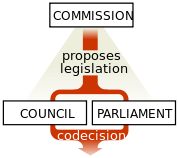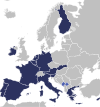Presidency of the Council of the European Union
| Presidency of the Council of the European Union |
|
|---|---|
Current Presidency logo |
|
|
Incumbent
Belgium |
|
| Term length | Six months |
| Inaugural holder | Belgium |
| Formation | 1958 |
| Website | www.eutrio.be |
| European Union |
 This article is part of the series: |
|
Policies and issues
|
|
Foreign relations
|
Presidency of the Council of the European Union is the responsibility for the functioning of the Council of the European Union that rotates between the member states of the European Union (EU) every six months. The presidency is not a single president but rather the task is undertaken by a national government. Three successive presidencies, known as presidency trios, cooperate to provide additional continuity by sharing common political programmes. The current trio consists of Spain, Belgium and Hungary.
Contents |
History
When the Council was established, its work was minimal and the presidency rotated between each of the then-six members every six months. However as the work load of the Council grew and the membership increased, the lack of coordination between each successive six month presidency hindered the development of long-term priorities for the EU.
In order to rectify the situation, the idea of trio presidencies were put forward where groups of three successive presidencies cooperated on a common political program. This was implemented in 2007 and formally laid down in the EU treaties in 2009 via the Treaty of Lisbon.
The Treaty of Lisbon also reduced the importance of the Presidency significantly by officially separating the European Council (EU heads of state or government) from the Council of the European Union, thus terminating the capacity of the head of state or government of the member state holding the Presidency to be President of the European Council. Simultaneously it split the foreign affairs Council configuration from the General Affairs configuration and made the High Representative the chairman rather than the foreign minister of the Presidency state.
On top of the intended downgrading of the rotating Council presidency, the presidency has become even less influential in practice than planned. The High Representative has been taking on roles previously guarded by the presidency country's foreign minister and the European Council president has begun acting on finance policy; the most important policy area left to the rotating presidency. It is expected that the European Council president would be strengthened further when Belgium holds the rotating Presidency.[1] There was some previous opposition to downgrading the rotating presidency too much, with Sweden claiming it would disengage member states from feeling actively engaged in running the EU, especially smaller states.
Functioning
The Council meets in various formations where its composition depends on the topic discussed. For example, the Agriculture Council is composed of the national ministers responsible for Agriculture.
The primary responsibility of the Presidency is to organise and chair all meetings of the Council, apart from the Foreign Affairs Council which is chaired by the High Representative. So the Minister of Agriculture for the state holding the presidency chairs the Agriculture council. This role includes working out compromises capable of resolving difficulties.
Article 16(9) of the Treaty on European Union provides:
The Presidency of Council configurations, other than that of Foreign Affairs, shall be held by Member State representatives in the Council on the basis of equal rotation, in accordance with the conditions established in accordance with Article 236 of the Treaty on the Functioning of the European Union.
Each three successive presidencies cooperate on a "triple-shared presidency" work together over a 1.5 year period to accomplish a common agenda by the current president simply continuing the work of the previous "lead-president" after the end of his/her term. This ensures more consistency in comparison to a usual single six month presidency and each three includes a new member state. This allows new member states to hold the presidency sooner and helps old member states pass their experience to the new members.
List of rotations
| Period | Trio | Holder | Website | ||
|---|---|---|---|---|---|
| 1958 | Jan-Jun | ||||
| Jul-Dec | |||||
| 1959 | Jan-Jun | ||||
| Jul-Dec | |||||
| 1960 | Jan-Jun | ||||
| Jul-Dec | |||||
| 1961 | Jan-Jun | ||||
| Jul-Dec | |||||
| 1962 | Jan-Jun | ||||
| Jul-Dec | |||||
| 1963 | Jan-Jun | ||||
| Jul-Dec | |||||
| 1964 | Jan-Jun | ||||
| Jul-Dec | |||||
| 1965 | Jan-Jun | ||||
| Jul-Dec | |||||
| 1966 | Jan-Jun | ||||
| Jul-Dec | |||||
| 1967 | Jan-Jun | ||||
| Jul-Dec | |||||
| 1968 | Jan-Jun | ||||
| Jul-Dec | |||||
| 1969 | Jan-Jun | ||||
| Jul-Dec | |||||
| 1970 | Jan-Jun | ||||
| Jul-Dec | |||||
| 1971 | Jan-Jun | ||||
| Jul-Dec | |||||
| 1972 | Jan-Jun | ||||
| Jul-Dec | |||||
| 1973 | Jan-Jun | ||||
| Jul-Dec | |||||
| 1974 | Jan-Jun | ||||
| Jul-Dec | |||||
| 1975 | Jan-Jun | ||||
| Jul-Dec | |||||
| 1976 | Jan-Jun | ||||
| Jul-Dec | |||||
| 1977 | Jan-Jun | ||||
| Jul-Dec | |||||
| 1978 | Jan-Jun | ||||
| Jul-Dec | |||||
| 1979 | Jan-Jun | ||||
| Jul-Dec | |||||
| 1980 | Jan-Jun | ||||
| Jul-Dec | |||||
| 1981 | Jan-Jun | ||||
| Jul-Dec | |||||
| 1982 | Jan-Jun | ||||
| Jul-Dec | |||||
| 1983 | Jan-Jun | ||||
| Jul-Dec | |||||
| 1984 | Jan-Jun | ||||
| Jul-Dec | |||||
| 1985 | Jan-Jun | ||||
| Jul-Dec | |||||
| 1986 | Jan-Jun | ||||
| Jul-Dec | |||||
| 1987 | Jan-Jun | ||||
| Jul-Dec | |||||
| 1988 | Jan-Jun | ||||
| Jul-Dec | |||||
| 1989 | Jan-Jun | ||||
| Jul-Dec | |||||
| 1990 | Jan-Jun | ||||
| Jul-Dec | |||||
| 1991 | Jan-Jun | ||||
| Jul-Dec | |||||
| 1992 | Jan-Jun | ||||
| Jul-Dec | |||||
| 1993 | Jan-Jun | ||||
| Jul-Dec | |||||
| 1994 | Jan-Jun | ||||
| Jul-Dec | |||||
| 1995 | Jan-Jun | ||||
| Jul-Dec | |||||
| 1996 | Jan-Jun | ? | |||
| Jul-Dec | ? | ||||
| 1997 | Jan-Jun | ? | |||
| Jul-Dec | ? | ||||
| 1998 | Jan-Jun | presid.fco.gov.uk | |||
| Jul-Dec | ? | ||||
| 1999 | Jan-Jun | ? | |||
| Jul-Dec | presidency.finland.fi | ||||
| 2000 | Jan-Jun | ? | |||
| Jul-Dec | ? | ||||
| 2001 | Jan-Jun | eu2001.se | |||
| Jul-Dec | eu2001.be | ||||
| 2002 | Jan-Jun | ue2002.es | |||
| Jul-Dec | eu2002.dk | ||||
| 2003 | Jan-Jun | eu2003.gr | |||
| Jul-Dec | eu2003.it | ||||
| 2004 | Jan-Jun | eu2004.ie | |||
| Jul-Dec | eu2004.nl | ||||
| 2005 | Jan-Jun | eu2005.lu | |||
| Jul-Dec | eu2005.gov.uk | ||||
| 2006 | Jan-Jun | eu2006.at | |||
| Jul-Dec | eu2006.fi | ||||
| 2007 | Jan-Jun | T1 | eu2007.de | ||
| Jul-Dec | eu2007.pt | ||||
| 2008 | Jan-Jun | eu2008.si | |||
| Jul-Dec | T2 | ue2008.fr | |||
| 2009 | Jan-Jun | eu2009.cz | |||
| Jul-Dec | se2009.eu | ||||
| 2010 | Jan-Jun | T3 | eu2010.es[2] | [1] | |
| Jul-Dec | eutrio.be[2] | ||||
| 2011 | Jan-Jun | eutrio.hu[2] | |||
| Jul-Dec | T4 | pl2011.eu[3] | |||
| 2012 | Jan-Jun | TBD | |||
| Jul-Dec | TBD | ||||
| 2013 | Jan-Jun | T5 | eu2013.ie[4] | ||
| Jul-Dec | TBD | ||||
| 2014 | Jan-Jun | TBD | |||
| Jul-Dec | T6 | TBD | |||
| 2015 | Jan-Jun | TBD | |||
| Jul-Dec | TBD | ||||
| 2016 | Jan-Jun | T7 | TBD | ||
| Jul-Dec | TBD | ||||
| 2017 | Jan-Jun | TBD | |||
| Jul-Dec | T8 | TBD | |||
| 2018 | Jan-Jun | TBD | |||
| Jul-Dec | TBD | ||||
| 2019 | Jan-Jun | T9 | TBD | ||
| Jul-Dec | TBD | ||||
| 2020 | Jan-Jun | TBD | |||
1Germany was due to succeed Austria in 2006 but stepped aside as general elections were scheduled for that period. Finland, as next in line, took their place. In the event, the German elections took place in 2005 due to a loss of confidence vote, but the re-arrangement remained.
See also
- List of presidents of EU institutions
- President of the European Parliament
- President of the European Council
- President of the European Commission
References
- ↑ http://euobserver.com/9/30236
- ↑ 2.0 2.1 2.2 "The Trio of Presidencies of the Council of the European Union". http://eutrio.eu/.
- ↑ The official website for the Polish Presidency of the EU Council Polish Presidency of the EU Council; 22 October 2009; retrieved on 29 November 2009.
- ↑ .ie WHOIS lookup showing registration of eu2013.ie to Dept. Foreign Affairs
External links
- Presidency of the Council of the European Union
- Logos of the Council Presidencies
- Presidency order of Rotation List to 2020
- Radio France International dossier on French 6 month EU Presidency
|
||||||||||||||||||||





